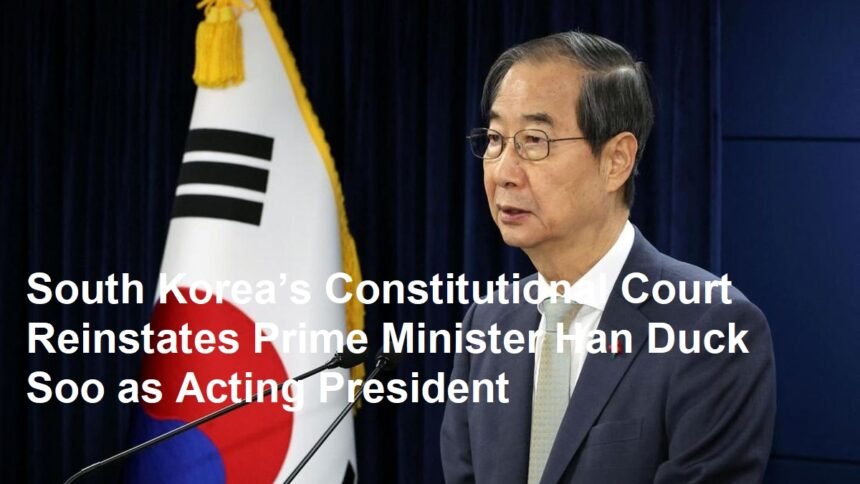Seoul, March 24, 2025 – In a landmark decision that has sent shockwaves through South Korea’s political landscape, the Constitutional Court on Monday reinstated Prime Minister Han Duck Soo as the acting president. This unexpected ruling, delivered on March 24, 2025, comes amid a period of intense political turbulence and has raised numerous questions regarding the future direction of the nation.
The ruling by the Constitutional Court marks a significant turning point in South Korean governance. The decision was reached after an exhaustive review of the constitutional provisions concerning presidential powers and succession procedures. According to court officials, the legal framework supports the appointment of the prime minister as the acting head of state in circumstances where the president is either unable to discharge their duties or where a vacancy has emerged. The court’s decision is based on a detailed interpretation of South Korea’s constitution, which prioritizes continuity of government and institutional stability.
Prime Minister Han Duck Soo, who has now been reinstated as the acting president, has been a prominent figure in the country’s political scene for several years. Known for his pragmatic approach and steady leadership, Han’s reinstatement is seen by many as an effort to restore order during these uncertain times. His previous tenure as prime minister was characterized by swift economic reforms and significant improvements in domestic policy, which earned him respect across party lines. Political commentators argue that his appointment as acting president is intended to bridge the gap between political factions and stabilize the nation amid growing public discontent.
Critics, however, have expressed concerns about the implications of the court’s decision. Opponents of the ruling argue that the move could be perceived as a departure from the established democratic process. “This decision raises important questions about the balance of power and the limits of judicial intervention in political affairs,” said one political analyst. “It is essential that the integrity of our democratic institutions is maintained, and any move that appears to sideline the will of the people must be scrutinized carefully.” Despite these criticisms, supporters of the decision contend that the court’s ruling adheres strictly to constitutional mandates and is designed to ensure governmental continuity during a period of instability.
The decision comes at a time when South Korea is grappling with several internal challenges, including economic uncertainty and growing public dissatisfaction with traditional political elites. With recent protests and calls for systemic reforms echoing throughout the country, many view the reinstatement of Han Duck Soo as a necessary step to calm turbulent political waters. The acting president is expected to implement measures aimed at addressing the immediate concerns of the populace while setting the stage for longer-term institutional reforms.
International observers have also taken note of the ruling, with some suggesting that the decision could have significant implications for regional stability. As South Korea plays a crucial role in East Asian geopolitics, any change in its leadership dynamics is likely to attract global attention. Analysts emphasize that while the decision reinforces the constitutional order within the country, it also highlights the challenges inherent in managing a rapidly evolving political environment. “This is not just an internal matter,” commented an expert on East Asian politics. “It has potential ramifications for our understanding of constitutional governance in democracies facing similar challenges.”
As Prime Minister Han Duck Soo assumes the role of acting president, his administration is expected to outline a clear roadmap for addressing the nation’s most pressing issues. Key priorities will likely include stabilizing the economy, restoring public confidence in government institutions, and preparing for the eventual transition to a fully elected presidency. While the path ahead remains uncertain, the Constitutional Court’s ruling represents a decisive moment in South Korea’s ongoing struggle to balance democratic ideals with the demands of governance.
In conclusion, the decision to reinstate Han Duck Soo as acting president underscores the importance of constitutional continuity during times of crisis. As the nation awaits further developments, all eyes will be on the new administration’s efforts to navigate a complex and shifting political landscape while upholding the principles of democracy and the rule of law.












